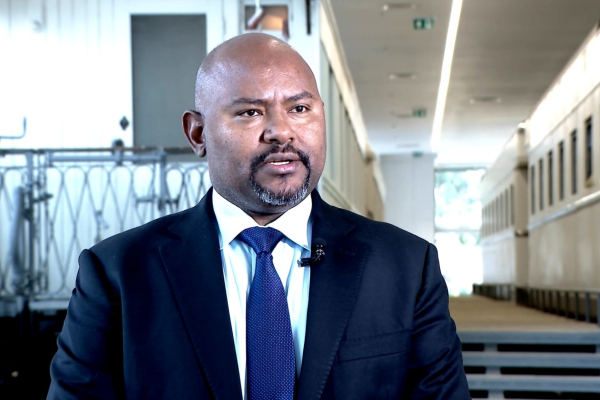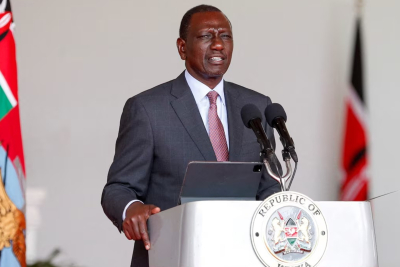
News (1790)
The initiative is part of NamPost’s digital transformation program. Called “Project Sky,” it aims to enhance the organization's operational efficiency, optimize the customer experience, and promote financial inclusion.
NamPost, Namibia's national postal operator, launched a mobile app and online banking services last week to expand access to its financial services. Customers of the state-owned enterprise can now check balances, make payments, and transfer funds electronically from their smartphones or any internet-enabled device without visiting a post office.
“The MyNamPost Banking App and Internet Banking are not just technological upgrades—they represent a commitment to bringing modern financial services to the people of Namibia, wherever they are. Our customers now have more control over their finances with digital tools that are simple, affordable, and convenient,” said Festus Hangula, NamPost’s Managing Director.
Emma Theofelus, Namibia’s Minister of Information and Communication Technology, acknowledged that innovative platforms like NamPost’s are crucial for financial inclusion. According to the World Bank, 71.35% of Namibians over the age of 15 had an account with a financial institution or mobile money provider in 2021, out of an estimated population of 2.5 million. However, she emphasized the need to equip all citizens “with the necessary skills to take advantage” of these services, noting the limited access to smartphones and the internet.
The International Telecommunication Union (ITU) reports that 79.6% of the Namibian population owns a mobile phone. Although the proportion of smartphone users is not specified, the ITU indicates that internet penetration in Namibia stands at 62.2%, with 63.2% of households having internet access at home.
However, the cost of internet access in Namibia remains relatively high compared to ITU standards, which recommend costs below or equal to 2% of gross national income (GNI) per capita. Namibians currently spend 2.6% of their GNI on mobile internet and 8.7% for fixed internet. According to the World Bank, Namibia’s GNI per capita was $12,170 in 2023.
Isaac K. Kassouwi
Last July, Ethiopian Prime Minister Abiy Ahmed launched a program aimed at training young people in digital skills. A few months after its launch, authorities are now assessing its progress.
Ethiopian authorities have trained 31,000 citizens in coding within three months, according to a recent statement by Belete Mola, Ethiopia’s Minister of Innovation and Technology. He made this announcement while reviewing the results of the past fiscal year.
Belete Mola stated, “Over 246,000 citizens have enrolled in the training, and 31,000 of them have been certified. The young people trained as coders and the tech startups with creative potential will receive special support.”
The "5 Million Ethiopian Coders" initiative, launched last July by Prime Minister Abiy Ahmed in partnership with the United Arab Emirates, is part of the "Digital Ethiopia 2025" plan. Its aim is to provide training in programming, Android app development, data science, and fundamental digital skills in artificial intelligence.
This initiative aligns with Ethiopia’s broader goal to establish itself as a major tech hub in East Africa. The World Bank estimates that nearly 230 million jobs in Sub-Saharan Africa will require digital skills by 2030. Through the "5 Million Ethiopian Coders" program, Ethiopian youth are being prepared to meet this demand.
Adoni Conrad Quenum
Intra-African trade encounters numerous obstacles, including the absence of a unified payment system. The adoption of Papss addresses these challenges by streamlining payment processes and reducing dependence on foreign currencies, thereby promoting increased trade within Africa and enhancing economic integration.
Kenyan President William Ruto has called on commercial banks to expedite their adoption of the Pan-African Payments and Settlement Systems (Papss), urging them to transition away from using the U.S. dollar for intra-African trade. The president revealed this at the launch of the Micro, Small and Medium Enterprises Accelerator programme at the Kenyatta International Convention Centre, Nairobi, on Wednesday, October 16.
Ruto emphasized the need to reduce transaction costs on the continent, which currently result in Africa losing over $5 billion annually. “With Papss, we can conduct transactions in our local currencies, significantly lowering exchange rate challenges and reducing transaction costs for businesses across Africa,” he noted, further encouraging banks to sign on to the system to enhance regional trade.
Raimond Molenje, acting CEO of the Kenya Bankers Association, confirmed that the association is actively working with the Central Bank of Kenya to implement a national switch to the Papss system, which would facilitate smoother trade with neighboring East African countries. This development aligns with Papss's goal of creating a single market for Africa and increasing intra-continental trade.
Papss, which was introduced by the African Continental Free Trade Area (AfCFTA) in 2019, facilitates seamless payments in local currencies across African nations. Initially piloted in the West African Monetary Zone, it was formally rolled out by Afreximbank in September 2021, with full operations beginning in early 2022.
The AfCFTA creates a single market for goods and services, allowing Kenyan businesses to access a market of over 1.3 billion people and a combined GDP of over $3.4 trillion. This significantly expands their customer base and revenue potential.
Hikmatu Bilali
Investing in digital infrastructure positions Africa for significant economic advancement by opening up opportunities for e-commerce, tech startups, and improved public services. Governments can leverage this trend to create jobs for its population
Governor Hyacinth Alia of Benue State signed a Memorandum of Understanding (MoU) with EVNT Technologies, a leading Saudi Arabian IT firm, aimed at transforming the state's digital landscape. The signing took place during the 2024 GITEX Global Summit in Dubai which ended on October 18.
The governor highlighted that this initiative “is a critical step towards realizing our vision of a truly digital Benue. It is about creating opportunities, empowering our people, and laying the groundwork for sustained economic growth."
Through the Benue Digital Infrastructure Company PLC (BDIC), the partnership will focus on expanding digital infrastructure, skills training, and digital policy development.
Hamad Al Saleh, founder of EVNT Technologies, expressed enthusiasm for making Benue a model for digital transformation in Nigeria. The implementation is expected to begin within 90 days, focusing on infrastructure development, capacity building, and digital innovation.
This move aligns with the National Digital Economy Policy and Strategy 2020 – 2030 (NDEPS), which aims to “transform the country into a leading digital economy providing quality life and digital economies for all.” Benue, by becoming a model for digital transformation, can leverage this trend to create jobs for its population.
Hikmatu Bilali
AI is projected to contribute significantly to the global economy. Africa’s investment in AI ensures the continent can tap into this booming sector, increasing its global competitiveness and fostering local innovation.
Zambia is establishing a second Artificial Intelligence (AI) Centre of Excellence in Lusaka. Felix Mutati, Zambia’s Minister of Science and Technology, announced this on October 20 while speaking at a solar panel handover and AI training event for teachers at Katoba Secondary School in Chongwe District.
Mutati revealed that the Katoba Secondary School will be transformed into an AI hub to advance AI-assisted learning and technological skills across schools nationwide. He emphasized the potential of AI to revolutionize Zambia’s education system, saying "AI will help teachers prepare lesson plans more efficiently and track student progress," highlighting its ability to make education more responsive to students’ and teachers’ needs.
This AI center complements the one launched a month earlier at the University of Zambia in collaboration with Google, aimed at fostering tech-driven solutions to the country's social challenges. This new hub will function as a training ground, enabling other schools to adopt AI-driven educational tools.
The initiative is funded by Ecobank, with Managing Director Aina Moore emphasizing the importance of providing students with access to modern technology and sustainable energy sources. This is part of Zambia’s larger effort to integrate AI into its educational system, positioning the country as a leader in tech-enabled learning in Africa.
Additionally, Zambia’s move towards AI integration comes in the wake of scholarships awarded by the Czech Republic for Zambian professionals to study AI, as well as calls from the Chamber of Mines for AI to be included in the Technical Education, Vocational, and Entrepreneurship Training (TEVET) curriculum.
These efforts are crucial, given that Zambia’s education system faces quality and access issues. In Zambia, the allocation for Early Childhood Education (ECE) has consistently remained low, with only about 0.4% of the education budget allocated to it between 2016 and 2020, according to the Zambia Education 2024 Budget brief by UNICEF. This falls significantly short of the recommended 10% investment. As a result, many children are deprived of crucial early learning experiences, entering primary school underprepared and at a disadvantage for Grade 1, hindering their ability to catch up with their peers. AI-driven tools could significantly improve lesson planning, personalized learning, and the monitoring of student progress, helping to close these educational gaps.
Hikmatu Bilali
African youth stand at the brink of a transformative era, requiring a collective effort to harness their potential for leadership and innovation. By investing in their education and training, they can become a driving force for the continent's development.
On Monday, October 21, Gabon's Deputy Prime Minister, Alexandre Barro Chambrier (photo, center), inaugurated the Gabonese Innovation Center (CGI). This initiative aims to transform the country's tech and entrepreneurial ecosystem, positioning Gabon as a key player in Central Africa’s technology sector.
"The Gabonese Innovation Center is not just a tool for technical development; it’s a catalyst for digital and social transformation. It will undoubtedly help develop our strategic economy with a single goal in mind: to be ready to address future threats. It is a guarantee of success," stated General Bonjean Frédérik Mbanza, the Minister of Digital Economy.
The CGI hosts several innovation-focused spaces, including a certification center for acquiring recognized digital skills, a FabLab (a creation and innovation space equipped with advanced technologies), a media lab for digital media collaboration, and a digital acclimatization hub (crucial for preparing Gabon for innovation and digital transformation).
This new center is part of Gabon's ongoing digital transformation, which seeks to make digital technology a driver of economic and social growth. As a result of these initiatives, the country ranks 10th on the continent with an ICT development index of 74.7 out of 100, according to the latest 2024 report from the International Telecommunication Union (ITU). In 2023, Gabon also held this position with a score of 72.9, reinforcing its progress in this strategic field.
The CGI will provide young people with opportunities to acquire certified skills in digital technologies, enhancing their employability in an increasingly digitized economy. By facilitating access to these new skills, the center is also expected to contribute to youth empowerment and their active participation in the country’s economic development.
Samira Njoya
Like many countries, Tunisia has embraced digital technology to modernize its operations. This initiative aims to enhance the efficiency and accuracy of processes, particularly when it comes to data collection.
Tunisia is set to conduct its thirteenth General Population and Housing Census from November 6 to December 31. This census, fully digitized, marks a shift from traditional paper-based methods. The government formalized the announcement with a decree issued by the head of government on Wednesday, October 16.
To ensure the success of this digital-first initiative, the National Institute of Statistics (INS) developed a Tunisian-made application to centralize data collection and enable real-time processing. Additionally, 9,000 tablets have been procured for census agents, who will visit households across the country. The project has a total budget of 89 million dinars (approximately 28.8 million USD), with 24% dedicated to IT infrastructure.
This initiative aligns with the country’s 2026-2030 development strategy. It is also part of the digital transformation efforts outlined in the National Strategic Plan “Tunisia Digital 2020.” The government is leveraging digital technology to optimize various sectors, including the census, where data accuracy is critical.
The use of digital tools will not only speed up the census process but also improve its accuracy. Tablets and a dedicated app will help eliminate errors often associated with manual methods. Real-time data collection will provide reliable statistics, essential for public policy planning, and enhance overall efficiency. Preliminary results are expected to be published in February 2025, with detailed data available by September 20, 2025.
Samira Njoya
As Africa’s digital economy continues to grow, investments in the sector become crucial. These investments play a critical role in driving sustainable development across the continent.
Nigeria has announced a $119 million investment aimed at strengthening its tech hubs and supporting the growth of micro, small, and medium-sized enterprises (MSMEs). The announcement was made following a meeting between Nigeria's Vice President Kashim Shettima and Swedish investors in Stockholm on October 17.
Vice President Shettima highlighted the importance of the investments, noting that "The government's 'Renewed Hope Agenda' emphasizes creating a competitive business environment that attracts both foreign and domestic investments.”
A key portion of the investment—$100 million—comes from Gluwa, a decentralized financial platform, which has committed to enhancing digital skills in the country. Gluwa’s Director, Akinola Jones, outlined plans to train over 30,000 Nigerians in digital technologies.
Additionally, Ericsson's Managing Director for Nigeria, Peter Olusoji Ogundele, revealed plans to invest $19 million in building a technology hub. Ogundele emphasized that the initiative would help develop local talent, positioning Nigeria as a global player in tech services.
Nigeria continues to attract substantial investor attention. At the recent GITEX Global event in Morocco, the UAE demonstrated interest in the country’s burgeoning tech sector, aiming to support the growth of its dynamic startup ecosystem. This highlights the increasing recognition of Nigeria as a key player in Africa’s tech innovation landscape.
According to Nigeria’s National Bureau of Statistics (NBS), the information and communication sector contributed 13.12% to the total Nominal GDP in the 2024 first quarter, highlighting the importance of digital transformation.
Hikmatu Bilali
SMEs employ the majority of people on the continent. However, they face numerous challenges, including limited access to capital, markets, and digital resources, which hampers their growth and ability to scale. Addressing these challenges is essential for achieving sustainable socioeconomic development in Africa.
On October 16, Littlefish announced a partnership with Visa to enhance digital experiences for businesses, providing advanced solutions for both in-store and online transactions. The omnichannel platform offering business solutions to financial institutions aims to empower micro, small, and medium-sized enterprises (MSMEs) across Africa.
Co-founder and CEO of Little Fish Brandon Roberts noted the importance of delivering “a seamless, cost-effective digital platform that empowers financial institutions to support sustainable growth in the MSME sector.”
The partnership also integrates Visa's CyberSource system, enhancing secure payment processing and opening the door for future products like remittance flows, lending, and loyalty programs. This collaboration marks a crucial step towards digital transformation for MSMEs in Africa, making commerce more efficient and accessible across the continent.
According to Forbes Africa, citing the World Economic Forum, MSMEs account for around 80% of businesses and more than 50% of the GDP in Africa. This underscores their importance to economic stability and job creation. However, these businesses often struggle with limited access to digital payment solutions and financial tools, which can hinder their growth potential.
As cash transactions continue to dominate daily business in Africa despite global digital payment trends, this collaboration addresses a significant gap. Visa and Littlefish will offer innovative payment solutions through traditional POS systems, mobile POS, Tap2Phone, and e-commerce channels, coupled with value-added services designed to streamline MSME operations and support growth.
Hikmatu Bilali
The Nigerian government is taking steps to develop digital skills among its population, with a focus on its youth. In May 2024, Nokia partnered with the country's telecom regulator to train young Nigerians in 4G and 5G technologies.
Swedish tech company Ericsson plans to invest $19 million in building a technology center in Nigeria. The initiative was disclosed on Thursday, October 17, by Peter Olusoji Ogundele, the managing director of the company’s Nigerian subsidiary, during a business forum held as part of a two-day working visit by Nigeria's Vice President, Kashim Shettima (pictured), in Sweden.
“Nigeria has enough youths that can come into that field. We can train them, Ericsson will also take part in it, and some of them we can export to the world, and we will be like another India,” Ogundele stated.
This partnership comes in the context of increasing demand for digital skills as the country’s digital transformation accelerates. In October 2023, the government launched the "3 Million Technical Talent (3MTT)" program, aiming to train 3 million Nigerians in technical skills over three years. In recent months, it has also formed partnerships with companies such as Finnish equipment manufacturer Nokia and telecom infrastructure builder IHS Towers to train Nigerians in digital competencies.
Ericsson’s initiative is expected to create additional jobs and enhance the skills of workers, addressing the growing need for a qualified workforce as Nigeria’s digital transformation progresses. A 2021 World Bank study estimates that Nigeria will require approximately 28 million workers trained in digital skills across various economic sectors by 2030.
Isaac K. Kassouwi
More...
Cybersecurity is becoming increasingly important as more of Africa’s economy, businesses, and public services go digital. Establishing cybersecurity infrastructure is a crucial step for several reasons, particularly given the context where data protection and digital security are critical for economic stability and growth.
The Federal Government of Nigeria, in partnership with cybersecurity firm Cisco, has announced plans to establish a state-of-the-art cybersecurity and broadband laboratory. This initiative aims to strengthen Nigeria's digital infrastructure and enhance its cybersecurity capabilities.
The announcement was made by Minister of Communications and Digital Economy, Bosun Tijani, after an inspection of the proposed facility on October 16. He noted that the collaboration with Cisco follows months of discussions, including talks "most recently on the sidelines of the United Nations General Assembly (UNGA79) in New York, where they reaffirmed their commitment to supporting our digital transformation initiatives."
Cybercrime in Nigeria is on the rise, with data breaches increasing by 64% in Q1 2023 compared to the previous quarter, the National Bureau of Statistics (NBS) highlights this concerning trend. This makes the initiative even more crucial for economic stability.
The lab will play a significant role in improving the country's cybersecurity capabilities, which is essential as more Nigerian businesses and individuals adopt digital platforms. Strengthening cybersecurity will not only help to protect sensitive data but also boost public confidence in Nigeria’s digital economy, enabling its continued growth.
Hikmatu Bilali
The Djiboutian government has outlined a clear vision: to drive the country toward digital emergence by 2035. A cornerstone of this transformation is the expansion of high-speed internet infrastructure, which the government sees as a vital catalyst for achieving this ambitious goal.
On Wednesday, October 16, Djibouti took a significant step toward digital transformation with the launch of its national broadband development strategy. The official presentation was held during a workshop organized by the Ministry of Communication, in charge of Posts and Telecommunications. This ambitious plan aims to accelerate the expansion of fiber-optic coverage and democratize access to high-speed internet, both fixed and mobile, across the entire country.
According to the Minister of Communication, responsible for Posts and Telecommunications, Radwan Abdillahi Bahdon (photo), the new strategy advocates for lower tariffs and doubling internet speeds without increasing costs. It also focuses on regulatory frameworks, promoting computer literacy, and developing infrastructure, among other priorities.
The initiative is part of the “Djibouti Digital Foundation” project. Supported by the World Bank, this project aims to transform Djibouti into a tech hub by 2035 by promoting digital services and creating a favorable environment for private sector investments in ICT.
Early results of this strategy include the deployment of 250 km of fiber-optic cable in the northern part of the country and the connection of over 100 administrative buildings to high-speed networks. These efforts have helped bridge the digital divide between regions and modernize public services.
With this new strategy, Djibouti aims to address its internet challenges. The country is currently connected to nine submarine fiber-optic cables. Despite these multiple connections, the World Bank has raised concerns about the high cost and poor quality of internet service. In its 2023 diagnostic report on Djibouti's digital economy, the international institution highlighted that the price of high-speed internet in Djibouti is among the highest in the Middle East and North Africa (MENA) region.
With an increasing number of young, tech-savvy consumers and rising internet penetration across the continent, Jumia’s strengthened presence could drive significant growth and innovation, ultimately contributing to the development of Africa’s broader eCommerce ecosystem.
On October 16, Jumia Technologies AG, the African eCommerce giant, announced plans to cease its operations in South Africa and Tunisia by the end of 2024. This strategic move aims to optimize resource allocation, allowing the company to concentrate on core markets with higher growth potential, such as Nigeria, Kenya, Egypt, and Morocco. The decision follows a thorough review of Jumia’s operations led by CEO Francis Dufay.
Explaining the move, Dufay said, “After a thorough analysis, we made the difficult decision to close down our operations in South Africa and Tunisia. The macroeconomic conditions in both markets, coupled with stiff competition, have limited growth potential.” In 2023, Jumia's South African arm, operating under the brand Zando, and its Tunisian operations contributed only 3.5% and 2.7% of total orders, respectively, underscoring their minimal impact on the company’s overall performance.
This closure aligns with Jumia's broader effort to streamline operations and enhance profitability amid challenging market conditions and competitive pressures. As the company refocuses on its core markets, it aims to leverage its marketplace, logistics network, and JumiaPay platform to drive sustainable growth in Africa’s most promising regions. This pivot reflects Jumia's commitment to adapting its strategy to navigate complex market dynamics and return to profitability.
According to the Africa E-Commerce Market Size, Share, Trends 2024-2032 report by the IMARC Group, the market is projected to reach $939.8 billion by 2032, growing at a compound annual growth rate (CAGR) of 14.4% from 2024 to 2032. This rapid expansion highlights the increasing role that online shopping will play in Africa's future, fueled by rising internet access, growing mobile penetration, and a youthful, tech-savvy population.
Hikmatu Bilali
Partnerships with advanced technology nations can accelerate Africa’s digital transformation by bringing in expertise, infrastructure, and cutting-edge technology. This helps build local capacity, allowing African nations to become more self-reliant and competitive globally in fields like tech manufacturing and innovation.
Kenya signed a Memorandum of Understanding (MoU) on October 15 with the Korea Electronic Association (KEA) to establish a $1.4 million tech manufacturing support center at Konza Technopolis. This initiative aims to accelerate local tech production and further establish Kenya as a technology hub in Africa. The center will support product launches, workforce training, and local production of high-tech products from leading Korean companies.
John Paul Okwiri, CEO of Konza Technopolis, emphasized the center’s potential to advance the region’s tech landscape, citing it as a “testament to our take off as we expect substantial investment by korea companies in the electronics and IT ecosystem.”
The center’s construction, expected to take two to three years, will be managed by KEA, which represents over 370 major Korean tech firms, including Samsung and LG Electronics. The project will unfold in four stages: initial planning, electronics manufacturing training, equipment installation, and operational expansion with enterprise support.
In its ECONOMIC SURVEY 2024, the Kenya National Bureau of Statistics revealed that the Information and Communication sector contributed 9.3% to GDP in 2023. To diversify the economy, the government aims to see this sector take on greater economic value. It has been undertaking policy reforms and major infrastructure projects to this end for several years to attract investors. This Tech Manufacturing Hub is one of the manifestations of this ambition.
The center is set to support the annual launch of 30 tech products, reducing average production time to six months. It also aims to train approximately 100 individuals while supporting over 100 local businesses. This collaboration reflects Kenya’s strategy to harness technology for economic growth, create jobs, and enhance its role in Africa’s digital economy.
Hikmatu Bilali















